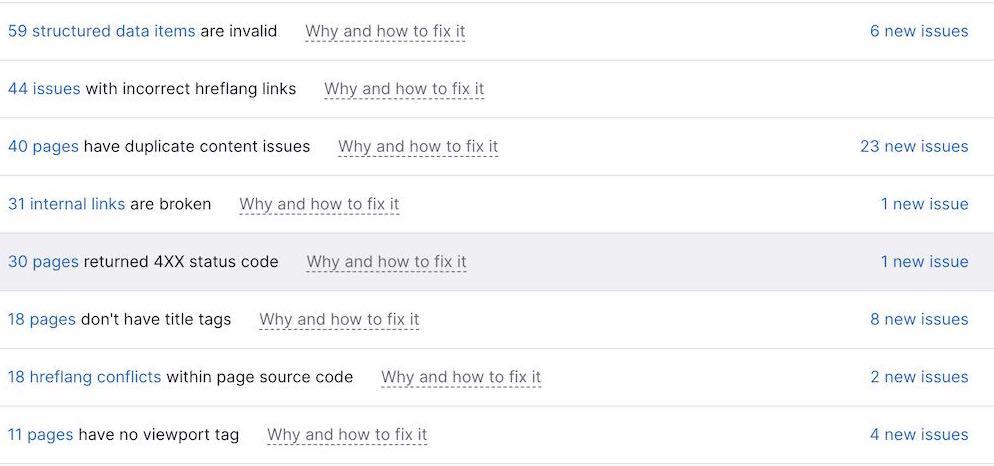How Much Does SEO Cost?
Naturally, if you are looking for SEO services, one of the first questions you have is how much does SEO cost?
Many successful brands from Canva to NerdWallet have leveraged SEO, or more formally search engine optimization, to fuel their growth organically. SEO can be a powerful growth engine. Recent estimates show that over 53% of website traffic comes from organic search. It makes sense considering there are roughly 5 to 8 billion searches made on Google each day. However, SEO is a long-term investment.
As with any digital marketing strategy, you want to know how much you need to invest in both time and money. SEO pricing can be complicated because there’s no standardized cost. Plus, there are several cost factors from the type of SEO service—technical SEO, YouTube SEO, content strategy—to experience, pricing model, and more.
If that all sounds confusing, don’t worry. We’ll walk you through how SEO services are priced and how to evaluate if an SEO agency or specialist is worth their salt.
SEO Pricing Models
The answer to how much does seo cost depends on several factors, including:
- Pricing model
- SEO service
- Expertise and experience
SEO pricing models fall into one of four buckets—monthly retainer, salary, hourly rate, or per project.
Monthly Retainer – Agency
Many SEO firms and agencies (Tuff included) operate on monthly retainers. As a client, you get the benefit of having a set monthly budget without any unexpected costs that sometimes arise with independent consultants or hourly freelancers.
You also get tools and a team of experts that most businesses don’t have access to in-house.
On the lowest end, the monthly retainer for a local SEO agency falls between $2,500 to $5,000 per month. Now, at this price point, SEO firms are usually working with local, small businesses that have minimal SEO needs. It also tends to focus on content and doesn’t include more technical SEO services.
Typically, the cost of monthly SEO services for higher-end agencies falls between $10,000 and $25,000. Many of Tuff’s clients fall in this range, and services usually include technical and SEO content strategies.
However, if your SEO needs require website development, custom designs, and landing pages, it can be more. Another factor that will increase the cost of SEO in your monthly retainer is the size of your business. Enterprises may pay upwards of $50,000 to $100,000 plus every month for extensive services, including global SEO and large word counts (15,000 words per month and up).
Salary – In-House
If you look up the average salary for an SEO specialist, it’s all over the place, and frankly, deceptively low.
According to Glassdoor, the total estimated annual pay for an SEO specialist is $72,539 per year. However, the limitation that many of these salary calculators have is that they tend to use a general average, without accounting for years of experience, special areas of expertise, or location. Although it might be more realistic for an entry-level position at a lower cost of living, it doesn’t reflect the rest of the market.
As someone with over ten years of experience, I’ve gotten to know many skilled SEO professionals. Most in my network would not take a position at a pay rate below $70,000. In reality, an experienced SEO specialist (with expertise in technical and content SEO) will look for a salary between $85,000 and $120,000.
Although, if they specialize in technical SEO and also have development or coding experience, expect to pay the rate you would for a developer (and then some).
When you are planning your in-house SEO budget, you’ll also need to factor in the cost of tools and subscriptions your team may need. Google Analytics, Search Console, and so on are free. However, many experts use Semrush, Ahrefs, SurferSEO, Screaming Frog, or a combination and those come with a monthly subscription cost.
Hourly Rate or Per Project – Freelancer
If you work with an independent or freelance SEO consultant, they typically charge per hour or project.
Again, the rate depends on your project and their experience. However, most freelancers charge between $100 to $150 per hour.
If they operate on a per-project basis, it ranges depending on the complexity and timeline. You can expect to pay at least $2,500 to $5,000 per project.
Although it is possible to pay for project-based SEO services, it is not always the best type of arrangement. SEO is ongoing. It’s like growing a garden. For anything to grow, you need to water and tend to it consistently. It’s the same for SEO—you need to consistently publish and refresh content to see meaningful results.
Per project works for temporary or occasional needs, which may make sense for a site migration or technical SEO audit.
Is the cost of SEO worth it?
Of course, as an SEO expert, I’m biased. However, data analyzing the ROI or return on investment of growth marketing strategies also shows that SEO is worth it.
Based on Smart Insights research, search engine optimization is second only to email marketing when it comes to ROI. On average, every $1 spent on SEO brings in over $22 in revenue. This varies depending on your industry.
Like PPC, with SEO, you can attract website visitors, get qualified leads, and increase conversions and sales. Unlike PPC, you aren’t paying anything when someone clicks on your site (outside of your SEO fees). So, you can reap the rewards of your organic efforts for years afterward. It may also take years to build up your traffic (which is why we combine SEO with PPC), but it can pay off in the end.
SEO is absolutely worth the investment, but unfortunately, not all SEO companies or freelancers are worth the cost. If you are tempted to outsource to a cheap SEO freelancer in another country, you can, but I strongly advise against it. At the least, do a very thorough vetting process. (I’ll offer guidance on how to do that and what to look for further in this blog.)
Hiring an inexperienced SEO freelancer or questionable agency can do more damage than doing nothing at all. I’ve come across several companies that unfortunately had these types of experiences. As a result, they end up paying more to fix the mess the last person made.
On top of that, Google punishes poor SEO practices, whether it’s low-quality content or technical mistakes. It can take months to years to recover from it.
What Is the Average Cost of SEO?
To recap, here are the common SEO pricing models and their costs. Keep in mind that each arrangement has pros and cons, and cost can vary based on the factors we mentioned above.
- Agency – monthly retainer of $10,000 – $25,000, more if you require web development
- In-House – salary of $85,000 to $110,000 per year, more depending on experience
- Freelancer – $100 to $150 per hour or $2,500 to $5,000 per project
What Services Are Included in SEO Packages?
You might still be scratching your head when asking—how much does SEO cost? If you aren’t familiar with the services SEO providers offer and what they mean for your business, it’s understandably difficult to understand the costs.
Below is a cheat sheet on common services to help you decide what you should include in your SEO budget.
Local SEO
Most entry-level SEO consultants start out doing local SEO, which means that you optimize your website and business so that it appears in local search results. So, if you want to grab an iced latte before work and search “coffee shop” on your phone, you’ll see a list of results like this one.
Most of the time, local SEO involves creating a Google Business Profile, managing your listing, reviews, and other factors that help capture people that are nearby your business location.
Because of its limited scope, it is one of the lowest cost services at about $300 to $2,000 per month. Most small business owners that are just starting out can save money by doing this on their own with some guidance.
Also, note that Tuff does not offer local SEO services.
Global or National SEO
Now, on the other end of the spectrum is national and global SEO. Although these are technically two different services, they both focus on broad searches. As you may have guessed, national SEO focuses on increasing your search visibility in a specific country.
Most growing startups and ecommerce companies need national SEO. Although, we don’t tend to call it that—it’s just referred to as SEO.
If you operate your business in multiple countries (and languages), then you’ll want to consider global search engine optimization, also called international SEO.
Large enterprises and ecommerce businesses from IKEA to Amazon have multiple variations of their sites for the different countries they operate. Each needs global SEO. The actual services vary, but SEO for international sites most commonly includes how to set up URL structures, handle duplicate content, and translate pages to different languages.
Because these services are similar, many agencies that offer SEO services (not local), have global SEO capabilities.
Technical SEO
Technical SEO services tend to be the most expensive, and here’s why—it’s specialized expertise that can require web development.
That said, it has a huge impact on your site performance. Great content means nothing if your site has technical issues.
Technical SEO services may include:
- Tech SEO audit – An expert will identify the specific errors that appear on your site and create a roadmap that details how they will be corrected.
- On-page optimizations – On-page is everything on your site that impacts your SEO. So, these optimizations update anything that impacts your site’s health and organic performance.
- Speed and Core Web Vitals – Google uses Core Web Vitals to measure your site’s speed, responsiveness, and user experience. Speed optimizations greatly improve your performance, but making them can take a lot of looking through and updating code.
- Site migration – If you are redesigning your website or moving it to another domain or content management system (CMS), you’ll need a tech SEO expert. They’ll ensure that everything is moved over properly, so you don’t lose valuable traffic.
This is just a small sample of what technical SEO experts offer. Most start off with an audit to identify what your site needs, and that can cost between $2,000 to $5,000. Then, implementation costs more, depending on your CMS and if you need a developer.
Link Building
There are tons of factors that impact how likely you are to appear at the top of search results. One of those factors is your authority score, also called domain rating. It’s a score between zero to 100, and it signals to Google the level of authority or trustworthiness of your site.
The higher your authority score, the more Google trusts you. Also, the more likely you will appear at the top of the search results faster.
Now, one of the only ways to accelerate your rankings and increase your own authority score is to get a lot of backlinks from high-quality sites—aka link building.
News and media publications like Forbes, Hubspot, TechCrunch, and so on have scores of 70 and up. New sites tend to have low scores until they build up their authority, which usually takes over a year. Spam and toxic sites also have low authority scores, so you want to avoid giving and receiving backlinks from them as it could tank your site’s health.
The cost of link building ranges, and, this might be controversial, but it’s an SEO service that I recommend doing in-house. If you outsource it to an agency, you really have to trust them and know that they understand your company.
In the old days of the Internet, some sites would swap backlinks easily or pay for them. Similar to never paying for Instagram followers, you should never pay for a backlink. (Sponsored content does not count.)
Buying backlinks is frowned upon by Google and could get you in hot water, especially if the links are from low-quality sites.
Most quality link-building opportunities originate from partnerships or relationship building. Or, they happen naturally when you create top-quality, original content like studies, research data, and templates.
Keyword Research and Content Strategy
Keyword research is the process of identifying the specific words and phrases that your target audience is searching for on search engines. It looks at relevant terms and prioritizes the ones that have a high search volume and low difficulty, meaning that you can realistically rank in the top 10 or above.
In addition to keyword research, you should also conduct a competitor analysis. Competitor research will reveal which brands are beating you in organic search. It will identify which terms and content are driving traffic to your competitor’s site and what you need to do to outrank them.
The idea is that if you rank for these keywords, you’ll increase your search visibility and reach customers at multiple stages of their buying journey. Your list of keywords helps you build a content strategy.
An SEO content strategy is more than just blogs. SEO content may include:
- Landing pages (with CRO and SEO copywriting)
- Pillar pages
- In-depth, how-to guides
- Templates
- Infographics
- Interactive content like quizzes
- Video (YouTube)
Some content marketing experts may know how to do keyword research and content strategy. However, it doesn’t mean that they have extensive knowledge of search engine optimization, especially technical SEO. Therefore, standalone keyword research and content strategy tend to be less expensive, but they are just as important.
An experienced SEO agency or consultant should help you understand which services you need and build an SEO package that helps you meet your specific business goals.
Green Flags – What to Look For in an SEO Company or Expert
Some green flags will signal whether or not a person or agency possesses SEO expertise, and consequently if they’re worth the cost.
If you’re looking for quality SEO services, they tend to have these habits.
1. Goes beyond what you’ll find in a tool
Tools like Ahrefs and Semrush have made SEO auditing easier. They will crawl your site and generate a list of errors that might look like the one below.
Now, if you are not familiar with SEO, this probably means nothing to you. Also, these are just tools, and they have limitations.
For example, they can flag items that aren’t actually high-priority SEO issues. An example of this is hreflang tags—these tell Google what language a page should show, depending on a user’s location. They are super important for global businesses, but if you don’t sell outside of the U.S., it isn’t a priority.
On top of that, how issues are fixed will depend on your unique site infrastructure, tech stack, CMS, and so on. These tools lack those personalized, problem-solving capabilities.
An expert won’t just regurgitate the report from an auditing tool. You can go to Semrush or Ahrefs, get a monthly subscription, and do that yourself. Like any tool, it takes a skilled person to wield it to its full potential.
2. Prioritizes low-hanging fruit and identifies opportunities
The value of having an SEO expert is that they provide context, prioritize issues, and educate you on what is most important to fix first.
For example, I create a technical SEO priority list for every new partner that I work with at Tuff. It includes the top three to five opportunities. These are usually low-hanging fruit—big issues that are easier to fix but will have a significant impact on health and performance.
In addition, an expert can go in and fix simple issues in a few clicks, when it would take someone else hours to weeks to figure it out.
3. Explains complex topics in simple terms
In addition to creating a priority list, I also provide context. For each issue, I explain in plain terms that anyone can understand:
- What the issue is
- Where it appears on the site
- Why it matters
- How to fix it
Most people don’t know what an hreflang tag is or why they shouldn’t have duplicate content on their site. If you are hiring an SEO agency, you don’t necessarily need to know what these things are, but you should understand their impact and feel welcome to ask questions.
4. Sets realistic expectations that are grounded in data
Let’s say an agency promises to grow your organic traffic and sales by 300% in three months, with only 5,000 words of content. They don’t show their data or projections for how they will do it. In that case, run. They are either lying or do not have experience. Either way, they are selling promises they won’t deliver on.
SEO takes time, but it does lead to incremental growth. Along with how much does SEO cost, you can absolutely and should ask what expectations or results do you expect?
Although it’s impossible to predict the future completely, you can estimate with experience and data. At Tuff, I also developed an SEO forecasting template and process that I use with new partners.
I pull two to three years of historical data and look at past organic traffic numbers to predict your future growth. For example, if you’ve hovered around 10,000 to 12,000 monthly organic traffic, you are not going to suddenly jump to 100,000 in a few months. (At least not in a way that is sustainable for months and months, and even then, you’re likely combining several one-off campaigns outside of SEO.)
5. Shows a deep understanding of your business, goals, and audience
The struggle that sometimes comes with outsourcing SEO to a freelancer or agency, is that don’t always understand the nuances of your business and audience. This really shows when they conduct keyword research.
For example, let’s say you run an online accounting business, but your target audience is large businesses in two or three industries. Someone that doesn’t understand your business fully may pull keywords like “individual income tax returns”, which isn’t relevant for businesses.
Instead, an expert will take the time to learn about you and your goals. Before even conducting keyword research, they’ll ask you:
- What questions do customers and prospects frequently ask your sales team?
- Which services do you do better than any of your competitors?
- What pain points does your audience have?
I encourage you to consider all of these options to find the right fit for your business. Hiring the wrong SEO agency or freelancer can do much more harm than good.
If someone’s cost seems too good to be true, it probably is—and you can’t afford to get SEO wrong. That doesn’t mean that an SEO agency that charges a large monthly retainer will mean better quality. It just means that it takes careful consideration to understand which are worth the value, and which are not.








